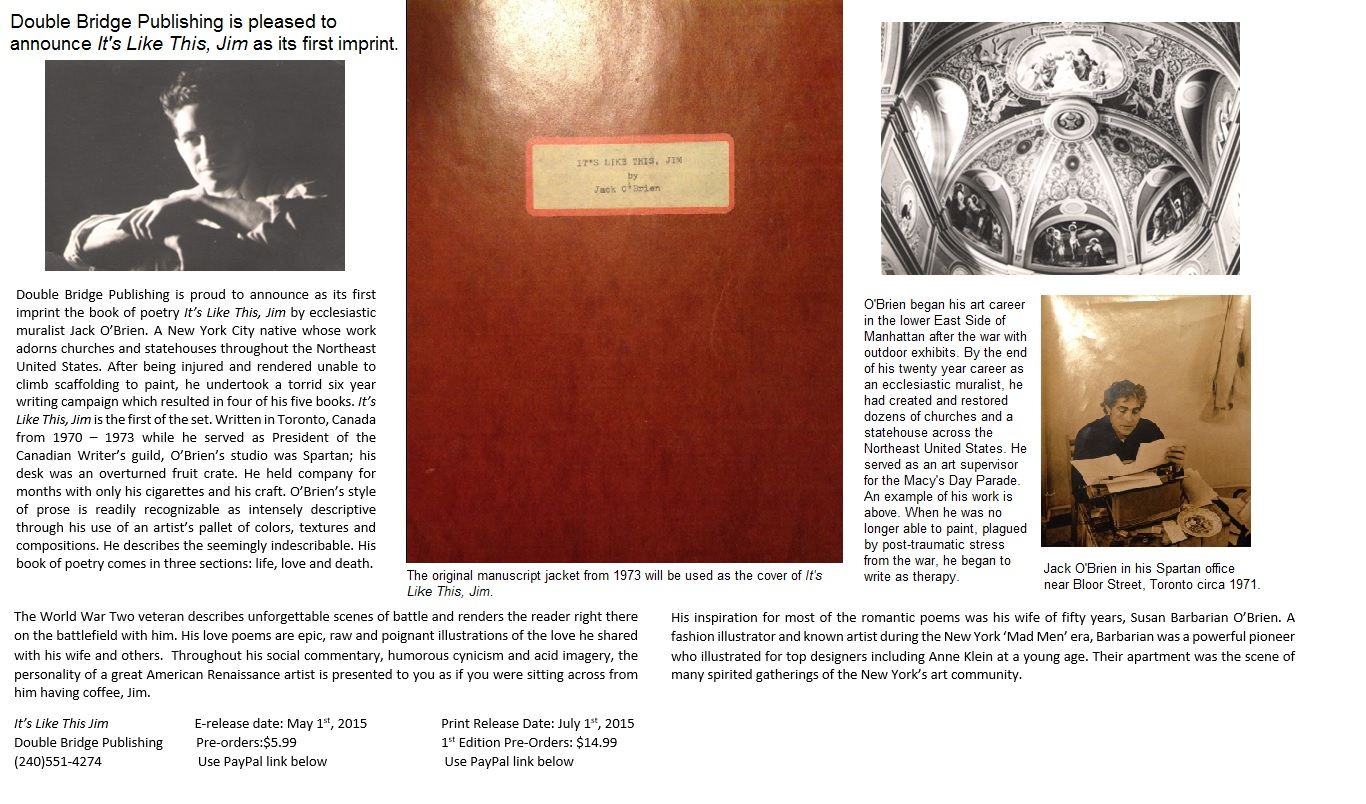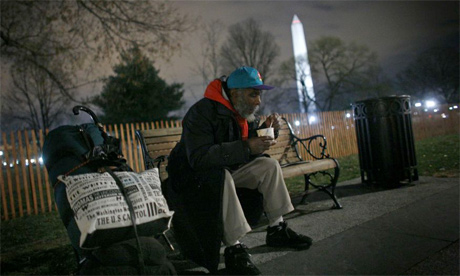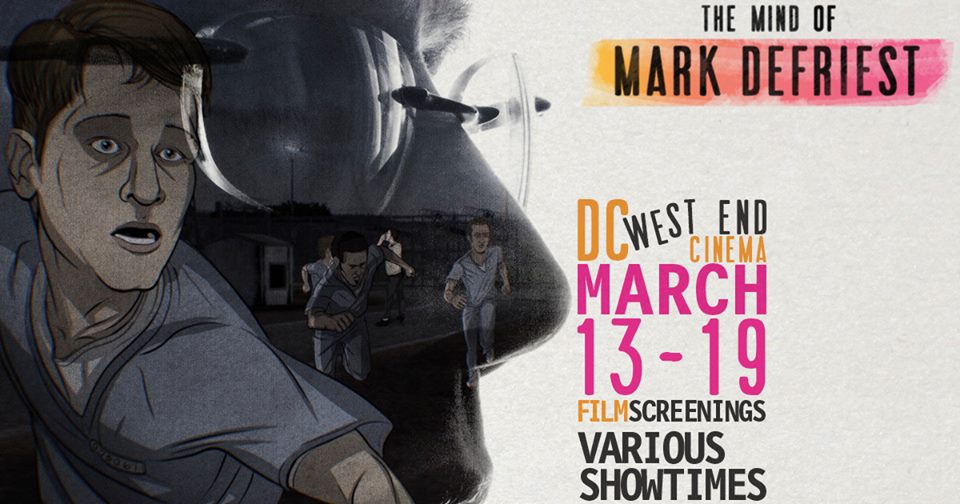« February 2015 | Main | April 2015 »
March 29, 2015
Crowdsourcing Double Bridge Publishing releases first book on May 1.
Washington, D.C.-based Double Bridge Publishing announced yesterday that its first imprint--"It's Like This, Jim", a book of poetry by Canadian writer and muralist Jack O'Brien--will be released May 1 (e-book) and June 1 (print). Launched six months ago by Richard O'Brien, Double Bridge features a crowdsourcing model for publishing, including the editing process. In addition, the company offers a popular written evaluation service in which for a nominal fee any writer--established or novice--is provided with probing and independent evaluations (or critiques) by three experienced editors, reviewers or other publishing industry veterans.

Posted by JD Hull at 04:13 AM | Comments (0)
March 24, 2015
Training Justin, Part II.
See our March 20 post, "Justin, exactly how would you like us to train you?" Two other lawyer-bloggers chimed in on the happy workplace theme--the nice-sounding theme featuring workers, especially younger ones, that never seems to make much room for clients or customers. Many of us had hoped that happy workplace theme was dead or dying. Apparently not. See these two pro-client/pro-customer pieces that come at the issue from different angles: "The Return of The Happy" by Scott Greenfield at Simple Justice, and "Stop Trying to Be Happy, Lawyers" by Kate Mangan writing at The Lawyerist.

Allergic to Work: Bob Denver as Maynard G. Krebs (CBS photo).
Posted by JD Hull at 03:05 AM | Comments (0)
March 20, 2015
Justin, exactly how would you like us to train you?
Read or skim in Entrepreneur this month the article "This Is How Millennials Want to Be Managed". It's a "happy workplace" piece and you can get its gist and message in a flash. We've all seen them before.
Finish it? Good. Thanks for reading. At the risk of sounding old, mean and cranky, let me make two quick comments.
First, in the last 15 years, my firm has hired, managed and worked closely with scores of Millennials/GenY--at least 100--and probably scrutinized even more members of that age group employed by my own clients or other law firms. I've also read maybe 50 misguided articles just like this one that urge us all to mold our people-management style at work to what certain generations, usually GenY, "want" based on their experiences growing up at home and how they were taught in school. While I want to know every single cultural and educational fact there is about each employee and team member, my obligations to understand "how they want to managed" are pretty close to zero. My informal advice to you employers--whether you're an older blue chip manufacturer with thousands of employees, or the next big player in molecular nanotechnology--is generally the same:
a. Get off your knees, you guys.
b. Ignore well-meaning writers and consultants who would have you manage people based a north star or "trend" other then your own vision and instincts.
c. Employees are important but they are "third"--after customers (#1) and the company or division you're managing or building (#2) to serve them. In service professions, clients are more important than any employee--and more important than the firm or company itself.
Second, I've been through the "we work better with constant feedback" thing with younger employees over and over again. Nearly 90% of the time--not all of the time but most of the time--that request means something quite different. It means that the requesting employees would like constant kudos and encouragement--think happy drumbeat or cheerleading--without negative criticism.
I know, it doesn't seem possible. I must be mistaken about what these employees would like as a "best practice" feedback. But that's what is happening here. The problem is obvious. A truly conscientious manager or mentor will never give that kind of "feedback". It teaches nothing, it dumbs down standards and, most importantly, it hurts customers or clients who have to live with those standards.
Thanks for listening.

Posted by JD Hull at 01:28 PM | Comments (0)
March 18, 2015
Round 2: "One Night, One Person".

Lots of us who work somewhere "downtown" during the day have a chance to participate in Round 2 of "One Night, One Person". See our March 5 and March 7 posts. Over the next 10 days, temperatures in virtually all of the Northeastern and Midwestern Yuppie-laden cities will hit freezing or well below, especially in Boston, Cleveland, Detroit and NYC. Others like Chicago, DC, Indianapolis, Columbus and Wilmington will approach or hit freezing. The "rules" here are simple. And intuitive. You find out--and you do this in person--exactly who on the streets needs warm wraps a night or two before they will really need it, and get that stuff to them directly within, say, 24 hours. Oh, and you may need to check weather forecasts in your cities. Cold winter nights are back for a while. For some, your excess winter clothing--and believe me, you have some--could certainly lessen what can only be described as suffering and even save a life. How much fleecy stuff from The North Face do you need to keep around the house anyway?
Here again are "rules" from our March 7 post:
1. Pick out and ask a homeless woman or man what articles of warm clothing she or he needs that you already have at home or in storage, for examples thermal gloves, wool scarfs, warm hats and beanies, big sweaters, winter coats, thermal underwear, socks, etc. Ask just one person at a time.
2. Agree on a time to meet (preferably at the same place) later that day or the next day.
3. Find the winter stuff you have at home or in storage.
4. Bring said stuff to the homeless woman or man as agreed. Nine out of ten times, your new friend will be there when you show up.
Posted by JD Hull at 08:21 AM | Comments (0)
March 13, 2015
See this extraordinary film.

Posted by JD Hull at 10:50 AM | Comments (0)
March 11, 2015
Checking in with Ms. Montague
Visit American expat Maryam Montague at her brand new blog and see Marrakesh: and a tale of Moroccan decorating at Peacock Pavilions. Maryam makes interior decorating so cool, tribalchic, intelligent and powerful that I'm thinking about changing my name to Raphael and opening up a shop near 14th and P.

Photo: Natalie Opensky and M. Montague

Photo: M. Montague

Photo: Natalie Opensky and M. Montague
Posted by JD Hull at 04:32 PM | Comments (0)
March 09, 2015
A Southern Town No More: Washington, D.C.
I've been back in Washington, D.C. for three months now, taking only a few short trips out of town since early December.
I live here again.
Even though I traveled here for clients and to see friends several times a year during my"'absence"'--two lengthy back-to-back stints in Pennsylvania and California--there have been quite a few non-physical changes to this town I didn't pick up on until I moved back. Atmospheric ones, if you will. All positive. And all are just fine by me. Three examples are changes (a) to D.C.'s international community (bigger, more sophisticated), (b) to its racial relations (astoundingly better; virtually integrated socially and in any number of local efforts to improve the quality of life on a number of fronts) and (c) to the overall intensity, energy, "rhythms" and pace of life (a quantum leap upwards here, too.)
It's beginning to behave like a 24-hour town, too. D.C. over time has been getting more and more like Manhattan--but apparently only in some of the better ways. Amazing.

At DuPont Circle's enduring Afterwords, the bookstore, café and restaurant do not close on weekends.
Posted by JD Hull at 02:38 PM | Comments (0)
March 07, 2015
Report on Inaugural "One Night, One Person": Thank you, a few good Yuppies--and there is lots more work to do.
Thank you, a few good Yuppies.
Let's do it again. Soon. With more people. With more soul.
Happy to hear that a few of you in the larger American northeastern cities--23-year-old GenY/Slackoisies at Boston offices of big consulting firms to late-60ish hard-driving Baby Boomer law firm partners in DC and Chicago who will die happy at their desks--participated in "One Night, One Person" in anticipation of the very cold last two nights (March 5 and 6). See our christening post last week, A Proposal For Cold City Nights: "One Night, One Person", which attracted a very respectable number of hits, by the way.
Nicely done. But we can do better than "a few". The bitter cold forecasted for the nights of March 5th and 6th hung on in some of the affected cities. In Washington, D.C. this fine bright morning it's 27 degrees at 11:15 AM. And certainly we can expect more cold nights before Spring finally takes over--so we have time and opportunity for you to get your "white collar angel" thing on and pick out a street sleeper to help. We can practice a little. Also: my guess is that some of you have problems engaging strangers anyway--not in your nature--and that chatting up street people is a pretty advanced exercise for a novice. Try it anyway. Take someone with you or whatever. Or I can help you with it if you ask. Just call. Below, and for your convenience, is ONOP in a nutshell and its four steps:
Whether you live in the suburbs or in a downtown neighborhood, if you work during the day in downtown areas of American cities with cold climate winters and significant homeless populations, go forth and do this:
1. Pick out and ask a homeless woman or man what articles of warm clothing she or he needs that you already have at home or in storage--thermal gloves, wool scarfs, warm hats and beanies, big sweaters, winter coats, thermal underwear, socks, etc. Ask just one person at a time.
2. Agree on a time to meet (preferably at the same place) later that day or the next day.
3. Find the winter stuff you have at home or in storage.
4. Bring said stuff to the homeless woman or man as agreed. Nine out of ten times, your new friend will be there when you show up.

Posted by JD Hull at 09:36 AM | Comments (0)
March 05, 2015
A Proposal For Cold City Nights: "One Night, One Person".
Every year winter cold claims lives of homeless people all over the world. In the United States, the number is thought to be roughly 1000 a year--but no one is really certain.
Tonight, Thursday, March 5, and tomorrow night, Friday, March 6, most Northeastern American cities and several Midwestern ones will see nighttime temperatures drop to between zero and 20 degrees Fahrenheit. The "One Night, One Person"* idea reflected in this post's title is that if you work during the day in downtown areas of one of certain American cities--i.e., you're a young or old yuppie, exec or professional between the ages of 22 and 72, and whether your politics are hopelessly right wing, left wing, nihilist, Ted Nugent, Rand Paul's dad--with significant homeless populations, go forth and do this:
1. Locate and ask a homeless woman or man what articles of warm clothing she or he needs that you already have at home or in storage--thermal gloves, wool scarfs, warm hats and beanies, big sweaters, winter coats, thermal underwear, socks, etc.;
2. Agree on a time to meet (preferably at the same place) later that day or the next day;
3. Quickly find the stuff you have at home or in storage; and
4. Bring said stuff to them as agreed. Don't worry, nine out of ten times, your new friend will be there when you show up.
And that's it. You can do One Night, One Person whenever a cold night is coming.
I've done this ten times in the last three weeks--at night and during daytime in downtown Washington, D.C., where I live and work--to see if it works--and it does. It's not time-consuming. It's not scary. It's not even that noble. From a humanitarian standpoint, this idea doesn't even make the team. It's not lofty enough to get a movie made about any of us. Maybe think of it simply as refusing to randomly run over someone you don't know with your car. Or better yet, the rent we each pay for taking up space on planet earth. None of us should get kudos or gold stars for basic human being-ness. If we know bitter cold one night can make someone suffer or die, and it's easy for us ensure that neither will probably happen, we do that.
Here are just some of the cold cities this week where you can do this, all with big homeless (and pretty big yuppie) populations: Baltimore (homeless population 4,500), Washington, D.C.(7,700), New York City (60,000 in shelter system, 5,500 on streets), Chicago (62,000 metro area), Boston (7,200) and Indianapolis (5,000 to 8,000, all Marion County) to name some. Sure, the way stats are developed and kept by different governments on homeless populations is not uniform and is often unreliable. True, some will find shelters or get put up in hotels this week. But not everyone will. And you can get a good idea of who they are on your way to work in the early morning and on your way home.
Once again, find them, ask them what they really need (or they can trade; someone will get it) and then bring your stuff back at an appointed time that day or the next day. My stuff? I had 31 scarfs, about 10 pairs of gloves, over 25 sweaters. Stuff I've had in some cases since the Beatles split up and never wore, including cashmere (very warm, by the way) because no one apparently noticed that since I was 10 or so that I only wore black or dark outfits even back then. I rarely wear colors or lighter clothing. (I'm glad I don't have to tell you about the ties). I did keep my letter sweaters and my Dad's--the guy had four of them through high school and college playing both hoops and football at Indiana schools--but anything else was fair game.
Oh. A new and amazing thing I tried, and you should, too: give away some stuff you really like.
Yes, the Catch: you have to talk to them. The homeless. The street sleepers. Or in the UK "those who are sleeping rough". But it's the best part. If you're not talky, pretend you're that man or woman you know or know of--your gabby senior class president in high school, your Uncle Seamus, my own Mom, Bill Clinton, or me--who can talk to anyone. You'll be surprised, as I was, with some of the conversations you'll have. If you are nervous or doing this at night, take someone with you. If you're in DC--and I'm not helping corporate America pay less in environmental fines or firing another guy named either Josh or Skyler--I will go with you.
There are so many different reasons people end up sleeping on the streets. But on a cold night, it shouldn't matter why. Few if any of the folks you will talk to are overtly nuts, stoned or drunk. However, if you are threatened or just feel threatened, walk away. Safety first, and all that. Please consider doing this NOW, for tonight and tomorrow night. If it's a go, you'll have to jump on this.
The cold has already cut short several American lives this winter. No need for more.
*Thanks, Peter Friedman, for the input on this and the "One Night, One Person" name.
.jpg)
That's the idea, David Beckham and skinny metrosexual Mayfair model guy. And give it up. The clothes, that is. London homelessness, by the way, is up 79% in last five years.
Posted by JD Hull at 04:22 PM | Comments (0)
March 02, 2015
New book by Elizabeth Wurtzel, enduring literary wunderkind. And these days one of the two or three authentic, interesting lawyers still living.
.jpg)
Posted by JD Hull at 07:09 PM | Comments (0)